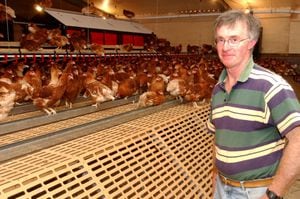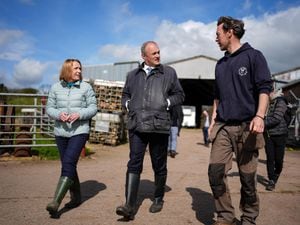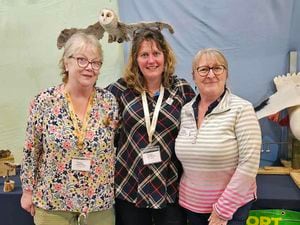Eggs scandal: Don't panic, ours are safe, say Shropshire farmers
Shropshire egg farmers have assured the public that people can buy locally produced eggs with confidence as it emerged that the crisis surrounding Dutch eggs was more serious than originally thought.

Four supermarket giants have taken products off their shelves in the wake of the egg contamination scare, which is now thought to affect 700,000 eggs from farms in the Netherlands, rather than the 21,000 first estimated.
Peter Jarvis, of Hollowdene Hens at Withington, near Shrewsbury, said most of his customers bought their eggs directly from him, and were aware that it was only Dutch eggs that had been implicated.
But he said one major trade customer had asked him for a written assurance that his eggs were unaffected.
He said the scare could actually prove beneficial for Shropshire egg farmers if it made people look more closely at the provenance of what they eat.
“It might make people realise that when you buy the cheapest, you don’t always get the best,” said Mr Jarvis. “People who buy eggs from me will try to buy local produce where they can, because they want to know where it has come from.”
Rob Newell, of Oaklands Farm Eggs at Ellerdine, near Telford, said it was important that consumers looked for the British lion crest which is stamped on eggs produced in this country as a guarantee of quality.
“British farmers invest a lot of money ensuring safety standards are far higher than in other European states,” he said.
“It is obviously a concern if consumers think that all eggs are affected, but we can assure customers that there is no risk whatsoever with British eggs, and the risk is very low with processed foods that use eggs from other countries,” he said.
Sainsbury’s, Morrisons, Waitrose and Asda have withdrawn a total of 11 products, including sandwiches, sandwich fillers and salads, from sale in the wake of the Fipronil contamination scare.
The move came as Dutch investigators detained two men suspected of being involved in the illegal use of the pesticide at poultry farms.
The Food Standards Agency said investigations into the incident suggested it was “very unlikely” that the eggs posed a risk to public health as it released a list of processed products withdrawn in the UK “to ensure that consumers are protected”.
The FSA said all products withdrawn in the UK were processed foods in which egg was one ingredient among many others, mostly used in sandwich fillings or other chilled foods.
Many of the eggs were mixed with others which had not come from affected farms so Fipronil residues would be highly diluted, it added.
FSA chairman Heather Hancock said: “I’m confident that acting quickly is the right thing to do.
“The number of eggs involved is small in proportion to the number of eggs we eat, and it is very unlikely that there is a risk to public health.
“Based on the available evidence there is no need for people to change the way they consume or cook eggs. However, Fipronil is not legally allowed for use near food-producing animals and it shouldn’t be there.”
The FSA said it had no evidence that eggs laid in the UK were contaminated or that Fipronil had been used inappropriately here, and testing results to date for England and Wales showed no exposure to the pesticide.
British egg processors have criticised the buying policies of the UK’s major supermarkets after the FSA released the list of withdrawn products.
British Lion Egg Processors chairman Ian Jones said: “The major retailers are operating to double standards when it comes to eggs. All of them stock British Lion shell eggs but they use imported eggs in many of their other foods containing eggs.
“This is just the latest of a number of food safety issues connected to eggs produced outside of the UK in recent years. Consumers clearly want retailers and food manufacturers to use good-quality British ingredients that are produced to high standards of food safety, but in some prepared foods this is not the case.”
Mr Jarvis said while the 700,000 eggs said to be affected sounded like a large number, it was small in the context of the number of eggs consumed in the UK.
Britain produces 85 per cent of the eggs it consumes but imports almost two billion annually.





